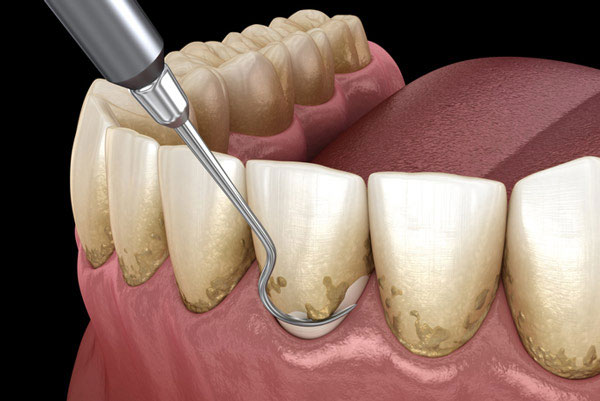Scaling and Root Planing Gum disease can be treated with a thorough cleaning by a scaling and root planing procedure. Gum disease can be treated with a thorough cleaning by a scaling and root planing procedure.Plaque is the sticky layer of bacteria that causes gum disease. If you fail to remove it properly, the bacteria in plaque can irritate and even cause the loss of gum tissue around the teeth. As a result, spaces will develop between your teeth and gums, called pockets. Consequently, plaque builds up in these spaces and cannot be brushed away. If neglected, gum disease could lead to tooth and bone loss. Gum disease, if diagnosed early with the structures underneath the gum line, can be treated. Scaling and root planing may be necessary if the spaces between your gums and teeth are particularly deep. Our doctors and our doctors can analyze the situation of your mouth and offer you a thorough examination to help you determine whether or not you need scaling and root planing. Why Do People Require Scaling and Root Planing?The following factors can increase your chances of getting periodontitis.
How Do You Perform Scaling and Root Planing?Before beginning any dental procedure, we will numb the area of your mouth with a topical or local anesthetic. Scaling is the process by which we remove plaque and tartar from a patient's teeth, above and below the gum line and into the periodontal pocket. Next, we will plane or smooth off the rough surfaces on the roots of your teeth. Your gums can heal and reconnect with your teeth with this treatment. Periodontal scaling and root planing may require more than one visit, depending on the severity of your condition. Are There Risks Involved in Scaling and Root Planing?There is a low chance of harm from having your teeth scaled. We may recommend an antibiotic or special mouthwash to use for a few days or weeks after the operation if you are at risk for infection. When Should You Approach Us?If you feel any of the following after having dental scaling and root planing performed, please contact us.
In most cases, any potential negative effects will fade away after a few weeks. What Can You Expect After Scaling and Root Planing?You should resume routine dental care procedures after your teeth scaling and root planing. In addition to the twice-a-day brushing and daily flossing, your teeth will be in the best possible shape. You can help keep the problem at bay with frequent dental checkups and a healthy, well-balanced diet. You might be put on a periodontal maintenance plan, requiring visits every three to four months rather than the usual six. |